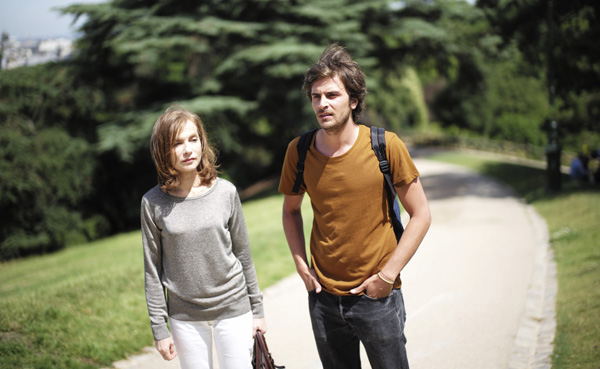The philosophy professor is not pleased. Sitting in a tense meeting at her longtime publishing house, her mouth forms a moue of distaste as the eager-beaver young staff dares to jazz up and dumb down a new edition of her definitive philosophy text. The candy-colored, “modern, aggressive, and catchy” cover they propose provokes a burst of scornful laughter from the author. In an instant, we see this woman facing the virtual collapse in rapid time of all she holds dear: high culture, scholarship, and the worship of Voltaire. We’ll later see her lose her comfortable marriage, her only parent, and other attachments, but you feel that the demolition of the cathedral of knowledge is the cruelest blow of all.
Perhaps it’s an unpardonable oversight not to mention right away that our movie, Things to Come, is ultra-French, and that its star is Isabelle Huppert, delivering a gimlet-eyed, ferociously single-minded performance as yet another tense, driven character. Hyper-alert, her mind and toned body vibrating restless energy, Huppert almost overpowers the movie. But professor Nathalie Chazeaux is the kind of woman who unwinds with a visit to the coastal grave of writer François-René de Chateaubriand, so the trademark Huppert style may fit after all.
Director Mia Hansen-Love probably did not intend the comparison, but Things to Come offers a revealing contrast with soft-headed, sentimental American culture (movies and more). An American film where the lead character gets dumped by her husband and buries her mother would likely dissolve into weepy fuzzies. And few American filmmakers would dare to populate a screenplay with lines like “Can the truth be debated?” and “I read your protégé’s essay on Adorno.”
But Things to Come arms Nathalie to attack life the French way, with intellectual rigor and her game face firmly on. When her longtime husband confesses that he’s fallen for another woman, her first reaction is to berate herself for being played for a fool. This prof imperiously refuses to engage with her classroom to discuss a student demonstration, instead she delivers heavy-furniture lectures on art and genius. She harbors a crush on a younger male mentee, but can’t quite admit it to herself. After her separation, she defensively shrugs, “I am lucky to be intellectually fulfilled…Women after 40 are fit for the trash.” Her adult children try to tease their mother, but they know better than to try to get the last word.
In short, a bourgeois bluestocking is due for a forcible widening of her horizons. We see a more vulnerable side of Nathalie early on as she cares for her once-beautiful and now needy, difficult mother, less intellectually driven than her daughter (who isn’t?) but just as haughty. Maman (Edith Scob) demands strawberries and oysters in the nursing home where Nathalie has reluctantly put her; her dramatic cell phone calls disturb Nathalie’s days and nights and rouse the local police. After the mother’s death, Nathalie meets with a priest to vouch for her parent’s life and request a religious service. In this poignant scene, Nathalie for once pays tribute to someone else and mercifully holds back from overthinking her story. It’s a lovely interlude that lays the groundwork for a looser, happier movie.
Nathalie will loosen up. She’ll inherit her mother’s cat, Pandora, and fretfully chase it when it gets lost. She’ll learn to hang out in the county, smoke a joint, and—horror of horrors—appreciate American honky-tonk music in a film that tends to overlay silent tears with German lieder. And becoming a grandmother will soften her, too. Oh, she’ll blurt out harsh pronouncements that offend her loved ones, but it wouldn’t be a Huppert performance without a little haughtiness in the offing.
The professor’s midlife transformation may come a little too free and easy. Would Nathalie—tough, snobbish, and often in denial of her feelings—yield so easily? Still we’re willing to root for earned, positive change. This proud character is thoroughly French, and American movies could use a few women like her.







Leave A Comment